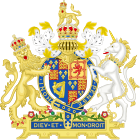This article includes a list of general references, but it lacks sufficient corresponding inline citations. (May 2012) |
 | |
| Long title | An Ordinance of the Lords and Commons assembled in Parliament, for the discharging of the Members of both Houses from all offices, both military and civil |
|---|---|
| Introduced by | Sir Henry Vane |
| Dates | |
| Commencement | 3 April 1645 |
Status: Revoked | |
The Self-denying Ordinance was passed by the English Parliament on 3 April 1645.[a] All members of the House of Commons or Lords who were also officers in the Parliamentary army or navy were required to resign one or the other, within 40 days from 3 April 1645.
It was part of a set of reforms designed to ensure victory, another being the establishment of a professional, centrally-controlled New Model Army, which replaced the existing system of regional armies. It was also linked to an internal political struggle between a Peace Party, who wanted a negotiated settlement with King Charles, and a War Party which wanted to dictate terms.
First introduced in December 1644, the bill passed at the second attempt. As members of the Lords could not resign their titles, it effectively removed aristocratic commanders like the Earls of Manchester and Essex. Under the amended version, they were still required to resign their commissions, but could be re-appointed.
- ^ Firth & Rait 1911, pp. III–XXXVIII.
Cite error: There are <ref group=lower-alpha> tags or {{efn}} templates on this page, but the references will not show without a {{reflist|group=lower-alpha}} template or {{notelist}} template (see the help page).
© MMXXIII Rich X Search. We shall prevail. All rights reserved. Rich X Search
